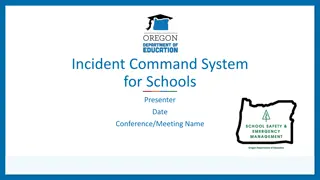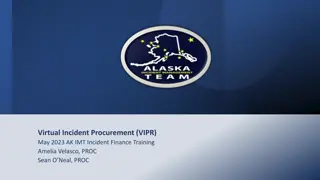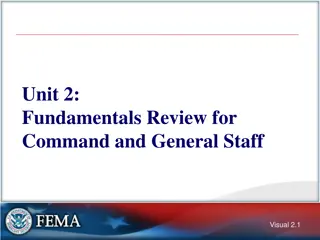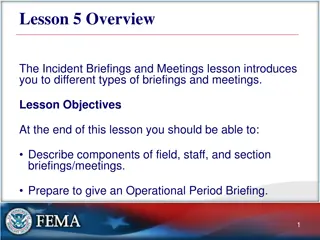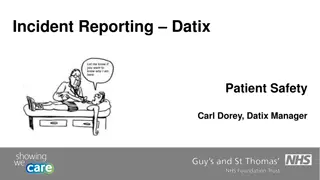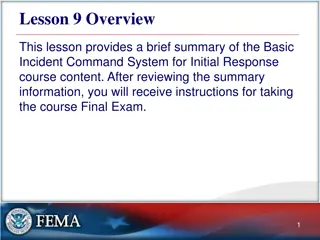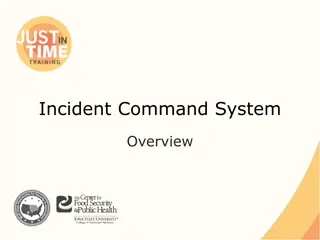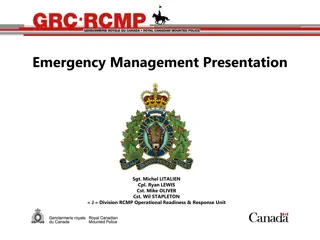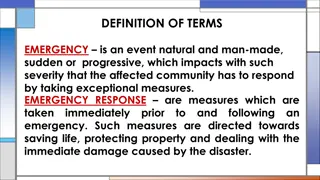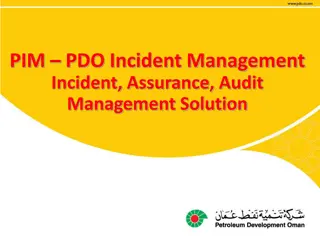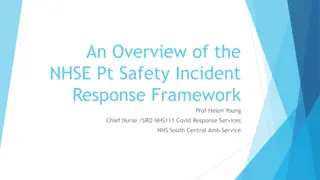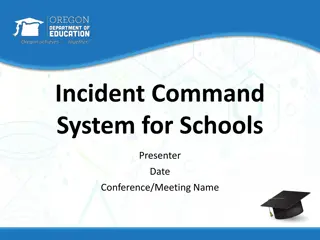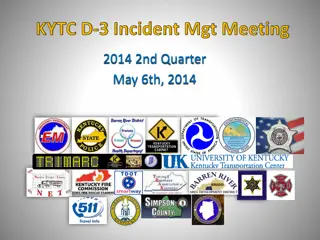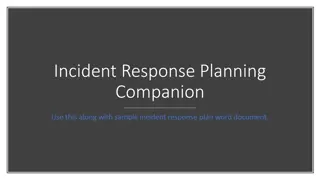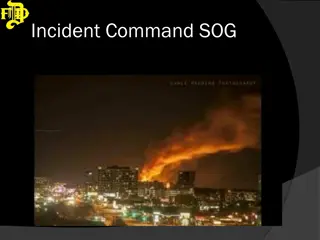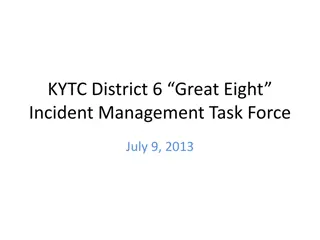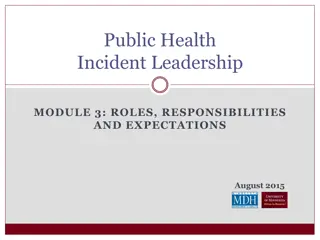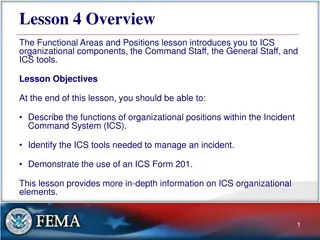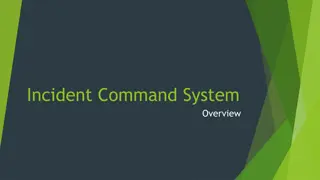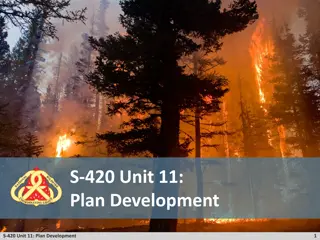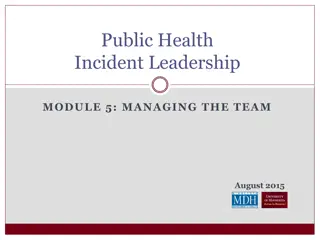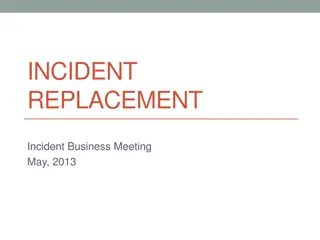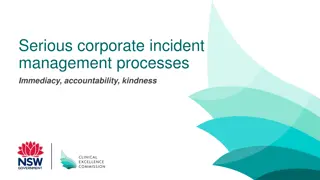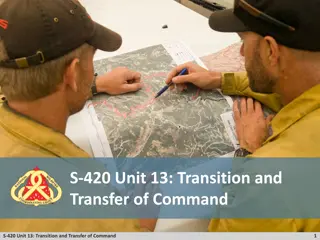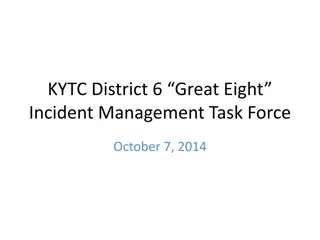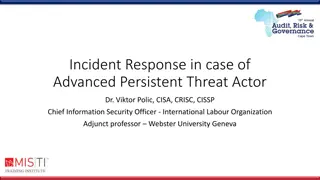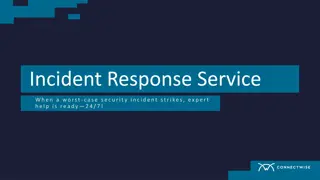Research into incident response
Blue Marble conducted research commissioned by Ofwat and CCW to understand customer experiences during the June 2023 water supply interruption in the South East Water region. The report aims to identify customer expectations, company responses, communication effectiveness, support provided, and area
1 views • 48 slides
Effective Incident Briefings and Meetings Overview
This lesson covers various types of briefings and meetings within the Incident Command System (ICS), including field, staff, and section briefings. It explores the Incident Action Planning Process for developing the IAP, emphasizing the importance of effective communication in incident management. T
0 views • 14 slides
Overview of UTSA's IS-6353 Incident Response Course
Introduction to the IS-6353 Incident Response course at UTSA covering topics such as course administration, information assurance, incident response, intrusion detection, and more. The course includes details on the schedule, grading criteria, required textbooks, and notable SQL injection breaches i
5 views • 47 slides
Comprehensive Overview of Incident Command System for Schools
This presentation provides a detailed insight into the Incident Command System (ICS) for schools, outlining its purpose, structure, key concepts, and how individuals can fit into an ICS during emergencies. Topics covered include coordination with community partners, the importance of ICS, its struct
2 views • 16 slides
Understanding Virtual Incident Procurement (VIPR) in Government Agencies
Virtual Incident Procurement (VIPR) is a web-based system used by the United States Department of Agriculture, Forest Service (USDA-FS) for incident procurement. It includes Incident Blanket Purchase Agreements (I-BPA) that allow Contracting Officers to create, award, and manage solicitation and agr
3 views • 37 slides
Understanding the Patient Safety Incident Response Framework (PSIRF)
The Patient Safety Incident Response Framework (PSIRF) is set to replace the Serious Incident Framework (2015) within the NHS, marking a significant shift in responding to patient safety incidents. Its key aims include compassionate engagement, system-based learning, proportionate responses, and sup
5 views • 9 slides
Resilient Incident Management Architecture for Business Continuity
An incident management architecture helps a global educational technology vendor overcome a major network outage caused by human error during routine maintenance. Communication breakdowns and internal tool failures worsen the situation, highlighting the importance of swift, effective incident respon
2 views • 20 slides
Incident Management Fundamentals and Command Structure Review
Explore key NIMS doctrine concepts, agency policies, incident complexity factors, and Unified Command functions in managing complex incidents or events. Learn about Incident Action Planning, transfer of command, and the roles of Command and General Staff positions. Gain insights into incident comple
0 views • 11 slides
_Mastering Incident Response with LDM Global_ A Comprehensive Guide
In the fast-paced digital era, data breaches and cyberattacks have become a common concern for businesses across various sectors, especially within the legal and financial domains. Effective incident response is crucial for mitigating these risks and ensuring that organizations remain compliant with
1 views • 12 slides
Incident Briefings and Meetings: Overview and Best Practices
This lesson covers various types of briefings and meetings within the Incident Command System (ICS), such as field, staff, and section briefings. Learn how to prepare and conduct operational period briefings effectively, understand the Incident Action Planning Process, and master the art of deliveri
2 views • 14 slides
Understanding Critical Incident Stress Management (CISM)
Critical Incident Stress Management (CISM) is crucial for addressing the emotional, physical, and psychological reactions to overwhelming events. This includes definitions of critical incidents, CISM teams, peer support, and crisis response teams. Learn how the International Critical Incident Stress
2 views • 25 slides
Understanding Incident Reporting in Healthcare
Incident reporting in healthcare is crucial for patient safety and organizational improvement. An incident can encompass a wide range of events that cause or have the potential to cause harm, loss, or damage. Reporting incidents, including near misses, allows for learning from both mistakes and succ
0 views • 10 slides
Basic Incident Command System Overview
This lesson provides a summary of the Basic Incident Command System for Initial Response course content. It covers the NIMS framework, ICS management systems, incident command structure, unity of command, communication protocols, delegation of authority, and management by objectives. Understanding t
5 views • 15 slides
Incident Command System Overview and Structure
Incident Command System (ICS) provides a standardized approach to incident management. It offers flexibility, adaptability, and efficient management for incidents of varying sizes and complexities. ICS consists of top-down structure with key functions like logistics, operations, planning, finance/ad
1 views • 22 slides
Enhancing Organizational Learning through BeSafe Taranaki Shared Learnings
BeSafe Taranaki Shared Learnings aims to facilitate cross-organizational learning by sharing insights from incidents and investigations. The focus is on identifying key lessons, target audiences, necessary process changes, and safety expectations. Two types of learnings are emphasized: Immediate Not
2 views • 9 slides
RCMP Emergency Management Overview
The Royal Canadian Mounted Police (RCMP) boasts a comprehensive Emergency Management (EM) Program aimed at enhancing its operational readiness and response to all-hazards emergencies. The program includes components such as National Emergency Planning, Incident Management System, and Best Practices.
2 views • 16 slides
Emergency Response and Management Overview
Understanding emergency response involves defining terms like emergency, supervision, command, and coordination. This includes the objectives of emergency response operations, key characteristics, requirements for effective response, and stages of response such as warning, threat, incident, assessme
6 views • 15 slides
Upgrade Highlights: Incident and Action Modules Enhancements
Explore the latest upgrades in the incident and action modules, including improved navigation, enhanced access controls, workflow changes, and new feature implementations like transportation consequences. Stay updated on the revamped Incident Management and Audit Solutions for efficient incident han
0 views • 10 slides
NHSE Patient Safety Incident Response Framework Overview
The NHSE Patient Safety Incident Response Framework (PSIRF) is a new system designed to shift from reactive to proactive incident investigation in patient safety. It promotes a just culture approach, prioritizes quality investigations, and emphasizes the engagement and support of patients, families,
1 views • 12 slides
Effective Incident Command System for School Emergency Preparedness
This presentation introduces the Incident Command System (ICS) for schools, emphasizing the importance of coordination with community partners and outlining the purpose and structure of the ICS. It explains key concepts, the roles within the system, and the sections involved in incident response. Ke
0 views • 13 slides
National Response Center Operations Overview
Established as a vital support entity in the National Response System, the National Response Center (NRC) serves as the federal contact point for pollution incident reporting. Handling various responsibilities such as coordinating responses to pollution, railroad, and port security incidents, the NR
0 views • 11 slides
KYTC.D-3 Incident Management Meeting 2nd Quarter May 6th, 2014
The KYTC.D-3 Incident Management Meeting for the 2nd quarter of 2014 held on May 6th discussed various topics including recent incidents, emergency plans, construction projects, spill cleanup, and upcoming training opportunities. Detailed incidents such as crashes and fires on I-65 and Nunn Pkwy wer
0 views • 24 slides
Cyber Incident Response Planning and Team Organization
This comprehensive incident response planning companion provides guidelines for creating effective policies and plans, emphasizing the importance of customization to suit each agency's unique circumstances. It outlines the purpose, objectives, and structure of an incident response plan, along with t
0 views • 16 slides
Incident Command Structure and Span of Control Overview
Incident Command Structure helps in managing incidents effectively by utilizing ICS terminology and levels as needed. The flexibility within ICS allows for structuring incidents correctly based on individual needs. Understanding the Span of Control is crucial for supervisors to manage the number of
2 views • 24 slides
KYTC District 6 Great Eight Incident Management Task Force Meeting Recap
Recap of the KYTC District 6 Great Eight Incident Management Task Force meeting held on July 9, 2013. The meeting covered incident reviews including a truck fire and fuel spill in Harrison County, responsibilities for debris removal after a truck/camper crash in Carroll County, a two semi crash in G
0 views • 44 slides
Chemical Lab Incident Response at Purdue University
On February 5, 2004, a chemical fire incident occurred in a chemistry lab at Purdue University. Despite the fire starting during a student experiment, prompt response from university staff and the Fire Department ensured the fire was quickly extinguished, with minimal equipment damage. The incident
0 views • 6 slides
Public Health Incident Leadership: Roles, Responsibilities, and Expectations
Explore the positions, responsibilities, and expectations within the Incident Command System in public health incidents. Learn about the Incident Commander's role, the need for timely decision-making, and the structure of the Incident Command System. Understand the importance of common processes and
0 views • 37 slides
Understanding Incident Command System (ICS) Organizational Components
This lesson introduces the key components of the Incident Command System (ICS), including the Command Staff, General Staff, and essential tools. It covers the roles of the Incident Commander, Deputy Incident Commander, and Command Staff positions, emphasizing their functions in managing incidents ef
0 views • 40 slides
Overview of Incident Command System (ICS) for Emergency Response
The Incident Command System (ICS) is a model designed for effective command, control, and coordination of emergency responses at various levels. It provides a structured framework for managing incidents, ensuring unified command, setting objectives, managing resources efficiently, and maintaining cl
0 views • 18 slides
Incident Management Plan Development Process Overview
The incident management plan development process involves activities such as preparation for tactics meeting, conducting the tactics meeting, and preparing for the planning meeting. The tactics meeting is crucial for breaking down overall incident objectives into tactical assignments for the next op
0 views • 8 slides
Effective Management of Public Health Incidents: Objectives and Team Leadership
Learn the importance of distinguishing between management objectives and incident objectives, linking objectives to response activities, and leading an Incident Management Team through the Planning P process. Explore the difference between general management objectives and operational incident objec
0 views • 28 slides
Lessons Learned from Roanoke City Health Department's Active Shooter Incident
Roanoke City Health Department faced a threat of an active shooter in 2016. The incident prompted immediate response actions, including mobilizing an incident command team and enhancing security measures. Transitional responses involved state-level collaboration for investigation and operational sec
0 views • 10 slides
Retirement Home Fire Safety Incident Report
A retirement home regulated under the Retirement Home Act, 2010 experienced a fire safety incident involving smoke alarms and evacuation procedures. The fire safety plan, approved in 2012, is under review. During a fire drill in 2014, a tenant failed to notify staff, resulting in a delayed response.
0 views • 20 slides
Incident Replacement Procedures and Guidelines in Business Meetings
Explore the process of incident replacement in business meetings, including who needs replacement items, approval authorities, and necessary forms to complete. Reference materials such as the IIBMH handbook and NWCG guidelines provide detailed insights into managing incidents effectively. Understand
0 views • 25 slides
Corporate Incident Management Processes and Policy Update
Explore the corporate incident management processes and policy updates focusing on immediacy, accountability, and kindness. Learn about incidents, harm scores, and revised process steps outlined by the Clinical Excellence Commission and NSW Health. Discover the differences between the current and re
0 views • 17 slides
Transition and Transfer of Incident Command
Ensuring effective transition and transfer of incident command is crucial for incident management. This involves activities such as demobilization planning, transfer of command planning, incident package creation, and more. Detailed plans need to be in place to facilitate a smooth handover of author
0 views • 12 slides
KYTC District 6 Incident Management Task Force Meeting Summary
The meeting of the KYTC District 6 Great Eight Incident Management Task Force on October 7, 2014, covered various incident reviews including the I-75 Brent Spence Bridge crash and an overturned semi on US 42. The meeting included introductions, approval of previous meeting minutes, and discussions o
0 views • 48 slides
Advanced Persistent Threat Incident Response: Case Study and Insights
An in-depth look at advanced persistent threat (APT) characteristics and incident response strategies, based on a case study timeline from 2016. Dr. Viktor Polic, a seasoned Chief Information Security Officer, shares key learnings and actions taken during the response to a sophisticated cyber attack
0 views • 17 slides
ConnectWise Incident Response Service: Expert Help for Security Incidents
ConnectWise Incident Response Service offers expert assistance 24/7 for handling worst-case security incidents. Gain direct access to incident response analysts, real-time management, recovery procedures, insights on attacker tactics, and post-incident monitoring. Choose from flexible service option
0 views • 13 slides
Essential Steps in Attackers Incident Response Process
Explore the crucial phases of Attackers Incident Response, starting from Information Gathering to Post-Exploitation techniques. Learn about Passive and Active Reconnaissance, OSINT resources, DNS fundamentals, and Google Dorks for reconnaissance. Gain insights into gathering actionable intelligence
0 views • 29 slides



